|
|
|
Sort Order |
|
|
|
Items / Page
|
|
|
|
|
|
|
| Srl | Item |
| 1 |
ID:
134217
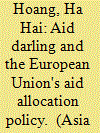

|
|
|
|
|
| Publication |
2014.
|
| Summary/Abstract |
This paper analyses the motivation determining the European Union's (EU) aid allocation to Vietnam. Existing literature and EU official documents are used to build upon four models with respect to new aid allocation: donor interest, recipient interest, recipient capacity and potential donor influence. The paper concludes that the EU's aid policy in Vietnam has a long-term objective in conformity with Vietnam's development strategy-poverty alleviation. Moreover, the EU's political and economic interests, a successful economic reform and development strategy, a high level of ownership (good governance) and potential donor influence are identified as contributions to make Vietnam an 'aid darling'.
|
|
|
|
|
|
|
|
|
|
|
|
|
|
|
|
| 2 |
ID:
172384
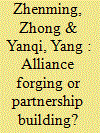

|
|
|
|
|
| Summary/Abstract |
Should China forge a military alliance? Some scholars believe it should, others believe it should adhere to a policy of non-alignment. For China many risks are associated with military alliances. On the one hand, China would likely be involved in unwanted conflicts and confrontations created by potential allies. On the other hand, China would be bound to compete with the existing hegemon, the United States, which has already established a huge alliance system, to win more allies. China just cannot afford this. The intensified strategic competition between China and the United States may also lead to a new antagonism in the Asia-Pacific region. Nevertheless, China’s ‘non-alliance’ policy does not mean China has to abandon the development of strategic cooperation with other countries or renounce the right to build a cooperative partnership network. Since Xi Jinping came to power, the Chinese government has continuously expanded its strategic partnership network in the region. This policy could avoid US-China competition over military allies and enhance strategic trust between China and its neighbouring countries, creating conditions for China’s peaceful development and global strategic stability.
|
|
|
|
|
|
|
|
|
|
|
|
|
|
|
|
| 3 |
ID:
127061
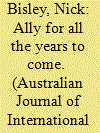

|
|
|
|
|
| Publication |
2013.
|
| Summary/Abstract |
In 2011, Australia communicated a clear choice about its strategic future. It would continue to cleave tightly to the US alliance, expand its military links and work to advance the USA's conception of regional order. Given its economic interests, why has Australia bound itself to the US alliance? What lies behind this strong commitment and what would it take for Australia to change its relationship with the USA? This article presents an analysis of the current state of the US-Australia alliance and argues that Canberra's pursuit of close relations with the USA reflects the interaction of a rational calculation of the costs and benefits of the alliance with a set of resolutely political factors that have produced the current policy setting. The article first assesses the security cost and benefit behind the alliance. It then argues that the move also derives from the strong domestic support for the US alliance, a sharpened sense that China's rise was generating regional instability that only the US primacy could manage and the realisation that the economic fallout of such a move would be minimal. It concludes with a brief reflection on what it might take to change the current policy settings.
|
|
|
|
|
|
|
|
|
|
|
|
|
|
|
|
| 4 |
ID:
143270
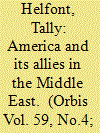

|
|
|
|
|
| Summary/Abstract |
Much has been said about a perceived steady decline of U.S. influence in the Middle East, and American weakness in the world more generally. Though there is some truth to the assertion that the United States’ ability to project power and assert influence in the Middle East has waned since it first sent occupying forces to the region in response to the attacks of 9/11, this does not necessarily equate to a black-and-white dichotomy of former might and current powerlessness. America's activities in Iraq in particular have led to some second and third order consequences that it will be dealing with for some time. While the empowerment of Iran is likely the most dominant negative consequence to emerge from America's activist foray into the region, the galvanizing of a strong pro-Western geopolitical alliance bloc poised to confront Iran and other subversive actors in the region is surely its most positive consequence. As this article will demonstrate, the ability of the United States to capitalize on opportunities created by the latter development have improved its strategic position in the region, and its maneuverability within it beyond what many have acknowledged.
|
|
|
|
|
|
|
|
|
|
|
|
|
|
|
|
| 5 |
ID:
130868
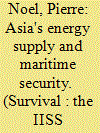

|
|
|
|
|
| Publication |
2014.
|
| Summary/Abstract |
Asia's reliance on international, seaborne energy trade is conducive to strategic cooperation. Whether this will outweigh strategic competition is far from certain. The Asia-Pacific accounts for a large and growing share of the world's energy-demand growth. With imports rising faster than consumption, the region is rapidly becoming the new centre of gravity for global energy markets. Such dynamics have made energy security a key policy concern for Asian states. The naval capacities of these countries are also growing swiftly, prompting some analysts to ask whether an arms race has begun. Although no one would suggest that this build-up of naval power is primarily driven by the need to secure energy supplies, the Chinese and Indian governments have identified energy and resource security as one rationale for developing naval power, particularly blue-water capabilities.
|
|
|
|
|
|
|
|
|
|
|
|
|
|
|
|
| 6 |
ID:
137223
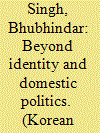

|
|
|
|
|
| Summary/Abstract |
South Korea and Japan have experienced their worst deterioration of bilateral relations since 2012. What are the long-term prospects for this relationship? Will it continue on this negative trajectory or recover positively in the long term? Challenging the conventional view that supports the former conclusion, this paper argues for a positive outlook for the relationship in the long term. This is defended from a structural perspective relying on two long-term strategic trends for Northeast/ East Asia—the elevated uncertainty in the regional environment (due to North Korea and China’s strategic rise); and the rising strain on the U.S. military presence in both countries. In response to these structural pressures, South Korea and Japan will adapt and adopt strategies to defend their national security within a reformed U.S. alliance structure and strengthen strategic cooperation through bilateral and trilateral (with the United States) means.
|
|
|
|
|
|
|
|
|
|
|
|
|
|
|
|
| 7 |
ID:
131444
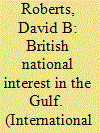

|
|
|
|
|
| Publication |
2014.
|
| Summary/Abstract |
The British government is in the process of re-energizing its relations with the Gulf states. A new Gulf strategy involving a range of activities including more frequent elite bilateral visits and proposals sometimes touted as Britain's military 'return to east of Suez' are two key elements of the overarching strategy. Such polices are designed to fall in line with British national interest as identified by the government-authored 2010 National Security Strategy (NSS), which emphasizes the importance of security, trade, and promoting and expanding British values and influence as perennial British raisons d'etat. In the short term, the Gulf initiatives reflect and compliment these core interests, partly based on Britain's historical role in the region, but mostly thanks to modern day trade interdependencies and mutually beneficial security-based cooperation. However, there is yet to emerge a coherent understanding of Britain's longer-term national interest in the region. Instead, government-led, party-political priorities, at the expense of thorough apolitical analysis of long-term interests, appear to be unduly influential on the origins of both the Gulf proposals and the NSS conclusions themselves. Without a clear strategic, neutral grounding, both the Gulf prioritization and the NSS itself are weakened and their longevity undermined.
|
|
|
|
|
|
|
|
|
|
|
|
|
|
|
|
| 8 |
ID:
133588
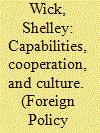

|
|
|
|
|
| Publication |
2014.
|
| Summary/Abstract |
The Sino-American relationship is arguably the most important bilateral relationship in the world. Whether this relationship remains peaceful or becomes conflictual will have far-reaching economic and political ramifications. For more than two decades, American analysts have been attempting to answer one question: Is China a threat to the United States? The result has been a voluminous collection of data that equally supports contradictory answers. I contend that if we want to understand the probable course of the Sino-American relationship, we need to ask a different question: When and why are Americans likely to perceive China as a threat? This paper reports the results of a social psychological experiment designed to explore the basis of American attitudes toward other states in general and toward China specifically. Contrary to expectations that economic insecurity drives American attitudes toward economic competitors, this study finds that American attitudes toward China are shaped primarily by cultural and institutional judgments. These results contribute to the field of IR by challenging preconceptions about the extent and potential impact of Americans' economic insecurities, by contributing to a nascent constructivist literature that examines how threat is constructed in the national imagination, and by informing how policymakers approach important bilateral relationships.
|
|
|
|
|
|
|
|
|
|
|
|
|
|
|
|
| 9 |
ID:
132554
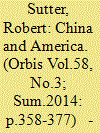

|
|
|
|
|
| Publication |
2014.
|
| Summary/Abstract |
While there have been many sources of tension in U.S.-China relations since the Cold War, they have been held in check generally by circumstances that have inclined the governments to cooperate. Yet, the relationship remains multi-faceted and fragile, and various frameworks and forecasts-like the contemporary "Great Divergence" framework, which speaks to the apparent disjunction between economic and security affairs-have proven to be incomplete and incorrect.
|
|
|
|
|
|
|
|
|
|
|
|
|
|
|
|
| 10 |
ID:
120505
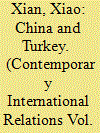

|
|
|
|
|
| Publication |
2013.
|
| Summary/Abstract |
China and Turkey, two emerging powers, are now entering a new stage of strategic cooperation. However, several new problems have emerged. There is considerable need to strengthen this strategic partnership which will require systematic effort from both sides.
|
|
|
|
|
|
|
|
|
|
|
|
|
|
|
|
| 11 |
ID:
142726
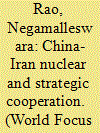

|
|
|
|
|
| Summary/Abstract |
Elevation of China-Iran nuclear cooperation is a factor which pushed both countries’ willingness to improve strategic and military cooperation. Iran’s nuclear programme can be traced to the Shah’s rule, in the initial years of the Islamic Republic. At this time Iran had made significant advances in nuclear technology. Eventually Iran focussed on nuclear technology and this caused Iran to seek help from China. In fact, Iraq was also trying to develop nuclear weapons at that time. Hence Iran had sought help from nuclear advanced countries along with India for building a research reactor, while this was utilised effectively by China and provided other assistance in nuclear research. The Iran-Iraq conflict was one of the reasons behind Iran’s ambition to become a nuclear power and to be independent in enriching uranium. China helped Iran’s nuclear programme in return for benefits relating to access to Iran’s energy resources. China had, along with Russia, assisted Iran’s nuclear programme for peaceful use of nuclear energy and also provided it with material and training support. However dual use technology transferred from China to Iran may have been used for nuclear weapons technology.
|
|
|
|
|
|
|
|
|
|
|
|
|
|
|
|
| 12 |
ID:
129691
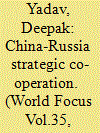

|
|
|
|
|
| Publication |
2014.
|
| Summary/Abstract |
Russia being the largest country and China being the most populous country on the planet, both collective are undoubtedly the two major powers of the international system. Russia being the successor of erstwhile Soviet Union wishes to regain the role once Soviet Union enjoyed whereas China being a communist country is also showing signs of new ambitions based on her history, population and military power and also her emergence as an important international economic actor. Relations between Moscow and Beijing have gone full circle in the past half century, from alliance to containment and now to strategic partnership.
|
|
|
|
|
|
|
|
|
|
|
|
|
|
|
|
| 13 |
ID:
127417
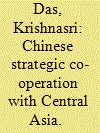

|
|
|
| 14 |
ID:
187215
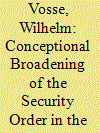

|
|
|
|
|
| Summary/Abstract |
This article argues that the focus of the still nascent Indo-Pacific “security order” should be extended from traditional, predominantly maritime, security concerns to include information and cybersecurity. This reflects the growing awareness that the global and regional security order is increasingly undermined by information technology and an AI duopoly. Therefore, it is necessary to broaden the concept “security order” to “cyber security order” with the aim of defending and strengthen a liberal order through cooperation in joint investment, technology exchange, and capacity building. Japan and Europe, which have long been strong defenders of international norms, have both broadened their security focus to include the Indo-Pacific, having recognized the gradual political shift towards this region. Their shared concern is that information and communication technology (ICT) can be used by governments and major technology companies to undermine democratic principles. Through several joint agreements the EU and Japan have not only deepened their mutual strategic cooperation, but they consider the protection of a free and open cyber security order in the Indo-Pacific as their joint endeavour.
|
|
|
|
|
|
|
|
|
|
|
|
|
|
|
|
| 15 |
ID:
133698
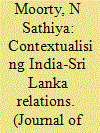

|
|
|
|
|
| Publication |
2014.
|
| Summary/Abstract |
Unlike what may have been reduced to in some circles, India- Sri Lanka relations are not a 'one-issue affair', centred on the vexatious ethnic problem in the island-nation, or on its influence and impact on
the south Indian State of Tamil Nadu. Instead, they continue to be multi-dimensional and multifarious, standing as testimony and test- case to the path of greater regional stability and cooperation, which
is in the interest of South Asia as a whole.
|
|
|
|
|
|
|
|
|
|
|
|
|
|
|
|
| 16 |
ID:
131512


|
|
|
|
|
| Publication |
2014.
|
| Summary/Abstract |
This research note highlights an important element missing from rational design theories of international agreements: "institutional context"-the presence or absence of existing and prior agreements between prospective partners in "new" cooperation. If, as rational design theorists argue, agreement design is deliberate, strategic, and directed toward enhancing contracting parties' ability to credibly commit to future cooperation, then prior design "successes" should influence the terms of additional cooperation. We test for this omitted variable problem in three agreement design outcomes: ex ante limitations on agreement duration, exit clauses, and dispute-settlement provisions. Through an augmentation and reanalysis of data from a key study in the rational design literature-Barbara Koremenos's "Contracting Around International Uncertainty"-we show institutional context is positively correlated with inclusion of ex ante time limitations in negotiated agreements and negatively correlated with the inclusion of exit clauses and third-party dispute-settlement provisions. Institutional context also mediates and conditions the effects of the explanatory variable at the heart of existing rational design theories-uncertainty about the future distribution of gains from cooperation. Our findings show that the collective appeal of particular design features varies not only with the nature of underlying strategic problems, but also with degrees of shared institutional context.
|
|
|
|
|
|
|
|
|
|
|
|
|
|
|
|
| 17 |
ID:
134038
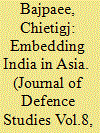

|
|
|
|
|
| Publication |
2014.
|
| Summary/Abstract |
The emergence of the Indo-Pacific as a new geopolitical frame ofreference is embedded in the growing strategic importance of themaritime domain and the rise of states that have demonstrated theability to 'transcend' their respective subregions. However, the Indo-Pacific remains a concept in its infancy, as evidenced by the fact that itcontinues to compete with alternative conceptions of regional space inAsia. This article argues that India has a vested interest in the survival ofthis new strategic geography as it serves to reinvigorate the momentumof its post-Cold War re-engagement with Asia under the aegis of its 'LookEast' and 'extended neighbourhood' policies. In this context, India shouldcontinue to cultivate the Indo-Pacific concept and ensure its embrace inthe region's evolving strategic vocabulary.
|
|
|
|
|
|
|
|
|
|
|
|
|
|
|
|
| 18 |
ID:
068214
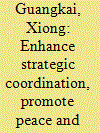

|
|
|
| 19 |
ID:
133596
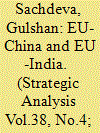

|
|
|
|
|
| Publication |
2014.
|
| Summary/Abstract |
More than a decade has passed since the European Union (EU) signed strategic partnerships with China (2003) and India (2004). The EU's 'honeymoon' with China was over within a few years while cooperation on truly strategic issues with India is yet to emerge. The core of both these relationships is still economics. While China has taken full advantage of the EU's institutional mechanism through more than 56 sectoral dialogues to promote its geopolitical goals and also to neutralise European concerns about democracy and human rights, Indian policy makers and analysts remain sceptical about Europe's role in global affairs. As a result, they have not bothered to use European capacities to promote their own interests through this partnership.
|
|
|
|
|
|
|
|
|
|
|
|
|
|
|
|
| 20 |
ID:
124823
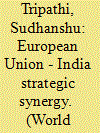

|
|
|
|
|
| Publication |
2013.
|
| Summary/Abstract |
Both the EU and India despite marked dissimilarities may be seen as emerging powers with shared features, interests and challenges. Although the ongoing dialogue between them holds, significant political for building a new world order based on justice, freedom and equality, if continue to underperform as both side have different perceptions of what the dialogue for strategic cooperation for new world order should stand for.
|
|
|
|
|
|
|
|
|
|
|
|
|
|
|
|
|
|
|
|
|